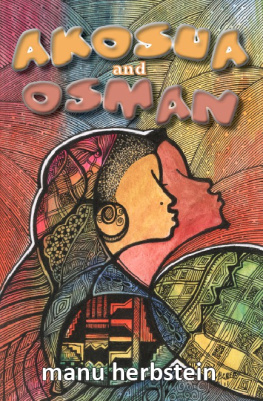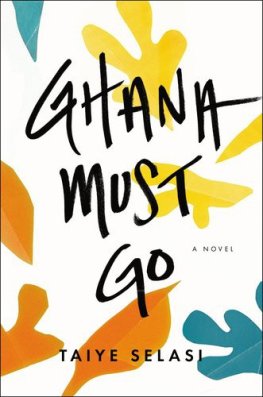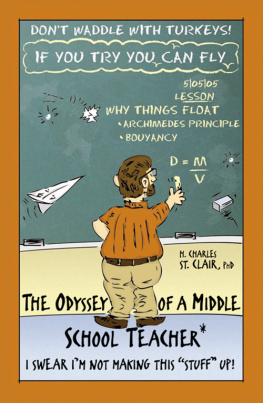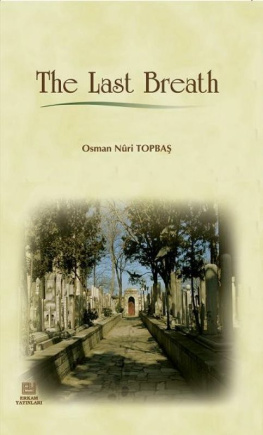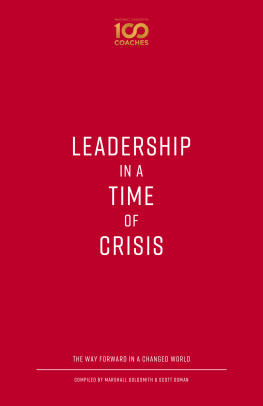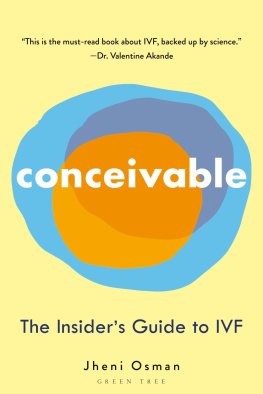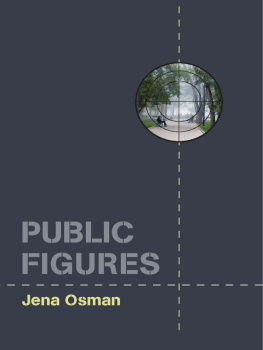AKOS UA
and
OSMAN
MANU HERBSTEIN
For Marie Helene, Sophie Akosua and Kwaku Thamsanqa
CHAPTER 1
Osman
E nglish is not my mother tongue. I used to hate it. And even now that Ive mastered it and made it work for me, I cant say that I have any love for it. Give me Hausa any day. Hausa is my mother tongue, though I have to say that it wasnt my mothers mother tongue. Does that sound strange? Try this, then. My mothers mother tongue was different from my fathers mother tongue. So they had to compromise. When they first met the only language they had in common was Hausa, so that was what they spoke to one other. Its true that they both spoke a little pidgin English, but that is not a respectable language. After they began to live together in Accra as man and wife, they picked up just enough Ga and Twi to manage. Later, my father went to Adult Education to learn proper English, because without proper English there was no way he could sit the exam he needed to pass for promotion from Corporal to Sergeant.
We spoke Hausa at home. I cant remember either of them ever speaking to me in English or in their own mother tongues.
All my father ever told me of his background was the name of his village and that of the nearest town, Saboba. Once or twice, he went there. I think that must have been when his father died and then again when his mother died. But he didnt take us with him.
My father didnt encourage questions. Then he died and the answers to all my unasked questions died with him.
After my father passed away my mother also became ill, so ill that she could no longer go to the market. We were lucky that the Commander let us keep my fathers room. He said that my mother should look for another place to stay but she didnt have the strength and he never did evict us. He said it was out of respect for my father, that he had been a good policeman, honest and respectful. When my mother was sick we had to survive on the small police pension and my fathers social security. Even that was difficult, because the Social Security office wanted my mother to produce a document to prove that she had been married to my father, but she had no such document, because they never had been married. That was when I first realized how important it was for me to master English. If you cant speak good English those people in the Social Security office despise you. They give you forms to fill in, full of questions which you have no idea how to answer. Unless you know English, that is.
Hajia Zainab told me, Osman, there is no way you can get on in this world, certainly in this country, unless you have made the English language your slave. Once you have done that you can make it do many things for you, things neither you nor I can even imagine now. I am a retired teacher, so I can help you. But the main job you will have to do yourself. Nobody is going to teach you what you are not willing to learn. There is only one way to master English and that is to read. Read, read, read. The road to your future is paved with books.
She signed me on at the Nima Childrens Library. But that was later.
My sister Afia could read and write a little Arabic. My fa ther thought girls shouldnt have too much education. So my mother used to take Afia to the market. When my father was still alive, the two of them would go together to the clinic at the Police Hospital every Monday in a police car, but when he died she had to take a taxi and I had to go with her because Afia wasnt much help. Some days, when my mother was feeling ill, she made me stay with her in our room. That was when I learned to cook. I was often absent from school at that time. My teacher thought I was playing truant and when I told him about my mother he accused me of telling lies. The boys whose parents were educated would send our teacher a note when their sons were absent, but my mother couldnt do that. My mother never learned to read and write; not in Hausa, certainly not in English, not even in her mother tongue. She was illiterate. It is hard to be illiterate. Nobody minds you.
At the end of the first term after my father died I failed my examination and had to repeat the class. As my mothers condition got worse, her medicines became more expensive and soon there was no money to pay my school fees. So I had to drop out of school.
I wasnt all that sorry because I didnt have good friends at that school. My classmates loved to tease me.
Osman, what are you? they would ask.
Im a Ghanaian, I would answer.
Yes, we know that. Were all Ghanaians. But what are you?
They wanted me to say that I was Dagomba or Frafra or Mossi or Kotokoli or whatever.
Once I asked my father what I was. He shut me up. It was only after he died and when I had to stay in our room with my mother that I began to understand why. My mother was a Dagomba, a black Dagbana, she told me. Her family were poor and she often went hungry. Then a man, a distant relative, offered to take her to Accra. He promised to find work for her. She would be able to send money back to her family. Her father agreed. The man put her to work as a porter, a kayayo , in the market and took all the money she earned, giving her just some small change for chop and soap. She had only one cloth and slept wherever she could find a place. When she was older she escaped from the mans clutches and moved to another market. She was scared that he would track her down but he never did and she never saw him again. Now, for the first time, she had some money of her own. She bought onions and put them on a head-tray and started trading. She told me that it was not easy but better than it had been when she first came to Accra. By that time she had lost all contact with her family.
One day a handsome young police constable spoke to her in Hausa. After that they would often meet. Then he invited her to his room at the Police Depot. She became pregnant. (That is, with me.) When her time came, she couldnt go back home, so she went and lived with my father. It was only then that she got to know that he was a Konkomba man. The Dagomba and the Konkomba hate each another. They never marry. Dagombas would think it shameful that a Konkomba man should have married one of their daughters. So my mother never thought of going home again and she didnt mix with the Dagombas in Accra because they might have asked embarrassing questions. In the same way, my father couldnt tell his people that he had married one of their enemies. They had only one more child, my sister Afia. They gave her that name because it means the end of all problems in Arabic. But it sounds like Afua, the name which the Akan give to girls born on Friday, so that is what people often called her.
There was only one bed in our room and my mother slept on it. Afia and I slept on mats on the floor. My first job every morning when I woke up was to take the bucket and go and fill it at the standpipe. It was only when I woke Afia to help me take the bucket from my head that I noticed something was wrong. My mother didnt respond to my morning greeting. I spoke to her again and then I shook her, but still she didnt respond. Then I went to call our neighbors, the wives of the policemen who lived in the rooms next to ours. They soon started wailing and in no time everyone on our floor knew that my mother was dead. They buried her the same day. We Muslims dont keep the bodies of our dead in the mortuary for months like the Christians, who like to call their children from America for their funerals so that they can make a big collection to cover their costs and hope to make a profit.
They took Afia and me to the Commanders house. That was the first time I had been in a proper house. All our lives we had lived in just one room: my father, my mother, Afia and me.
The Commissioners wife looked after us. She was a Christian. There was a big picture of Jesus Christ on the wall. I had learned about Jesus Christ in the madrassa. We Muslims honor him as a prophet but, unlike the Christians, we dont believe that he was the son of Allah. Anyway, the lady was kind to us. She gave us Fanta to drink. Then she sent two women sergeants with us to collect all our things from our room. All this time Afia was sobbing, quietly. I felt like crying too, but I didnt. When the Commander came home for his lunch, they went through my fathers papers and then they talked about what to do with us.
Next page
